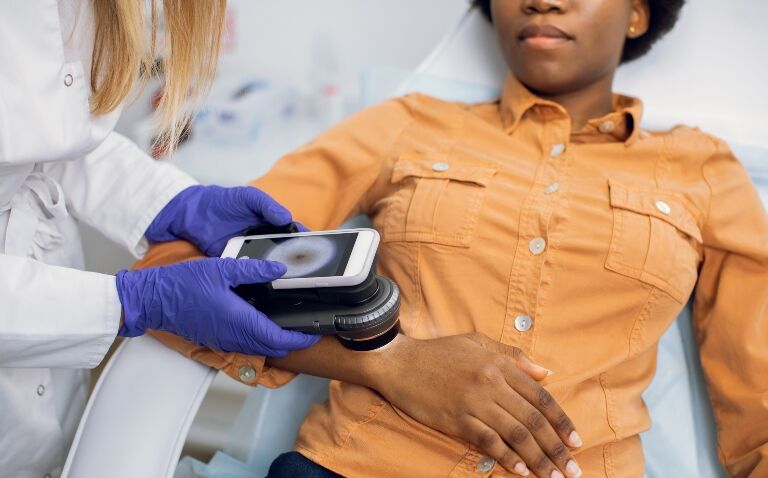The use of artificial intelligence (AI) software has shown a 100% detection rate for melanoma and saved over 1,000 face-to-face secondary care consultations during a 10-month period, according to a study presented at the recent European Academy of Dermatology and Venereology (EADV) Congress 2023.
The study was able to able to correctly detect all 59 cases of suspected melanoma between April 2022 and January 2023, as well as 99.5% of all skin cancers (189/190 cases) and 92.5% of pre-cancerous lesions (541/585).
The software assessed 22,356 patients with suspected skin cancers using three versions of an AI software. The first version tested in 2020-21 had an 85.9% detection rate for melanoma (195/227), 83.8% for all skin cancer (903/1,078) and 54.1% for pre-cancerous lesions (496/917).
Lead author Dr Kashini Andrew, a specialist registrar at University Hospitals Birmingham NHS Foundation Trust, commented: ‘The latest version of the software has saved over 1,000 face-to-face consultations in the secondary care setting between April 2022 and January 2023, freeing up more time for patients that need urgent attention.‘
The research team noted that the data is ‘incredibly encouraging‘, however, co-author and colleague, Dr Irshad Zaki, consultant dermatologist, said: ‘We would like to stress that AI should not be used as a standalone tool in skin cancer detection and that AI is not a substitute for consultant dermatologists.‘
Evidence of the need for appropriate clinical oversight was shown among the basal cell carcinoma cases as a single case was missed by the AI tool and later identified at a second read by what the researchers termed ‘a dermatologist “safety net“‘.
Dr Kashini Andrew added: ‘This study has demonstrated how AI is rapidly improving and learning, with the high accuracy directly attributable to improvements in AI training techniques and the quality of data used to train the AI.
‘The role of AI in dermatology and the most appropriate pathway are debated. Further research with appropriate clinical oversight may allow the deployment of AI as a triage tool. However, any pathway must demonstrate cost-effectiveness, and AI is currently not a standalone tool in dermatology. Our data shows the great promise of AI in future provision of healthcare.’
This supports the findings of previous studies including a 2022 systematic review in which the researchers concluded that ‘the performance of artificial intelligence in melanoma is satisfactory and the future for potential applications is enormous‘.










